Images are the property of the Lebanon Historical Society and copyright laws may apply.
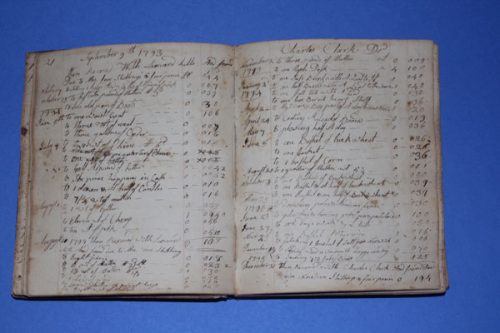
Account Book
Kept by Ambrose Williams and Julius Clark
1792-1871
Hand-written account book maintained by farmer-cooper Ambrose Williams (baptized 1759- died 1838) of Lebanon from 1792 until the late 1820s or early 1830s. During the Williams period, income from his wife Ruby’s sewing and dairying, from running a slitting/saw mill, renting out his horse(s) and oxen and his time working on other farms, supplemented Williams’ work on his own farm and in his cooper shop. The volume includes an index of names.
Between 1829 and 1834, Julius Clark took over record keeping mostly relating to livestock and by 1834 is renting the farm from Williams.
Gift of the Knox Office
1981.103.001
__________________________________________________________________________________
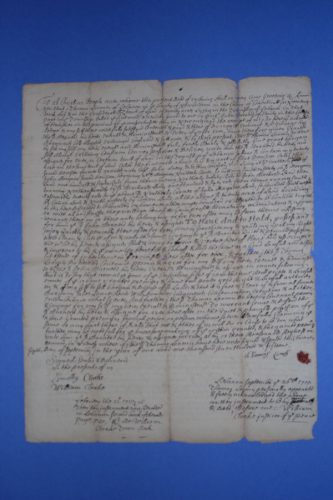
Deed
Thomas Loomis - 1715
Deed reads in part:
“To all Christian People unto whom the present Deed of Exchange shall or may come Greetings & know ye that I Thomas Loomis of Lebanon in ye County of New London in the Colony of Connecticut in New England for and in consideration of a tract of land of twenty acres Lying in the township of Lebanon in that part of ye Township called ye five mile already secured to me by Doctr John Barnard of Hadley in the County of Hampshire in the province of ye Massachusetts Bay…”
Doctor Barnard moved to Lebanon from Deerfield, Massachusetts and became a member of the First Church in 1704. Over the next several years he had children born in Lebanon. Although in 1704, John Baldwin gave Barnard 10 acres as an inducement to stay in Lebanon, by 1708 he had moved back to Deerfield and in 1715 he was living in Hadley. Thomas Loomis of Hatfield, Massachusetts, part of an extended Connecticut River Valley family that began moving to Lebanon by 1701, married Elizabeth Fowler in 1712/13, two or three years before this deed of exchange was executed. Loomis stayed in Lebanon. After Elizabeth died in 1742, he married Hannah Hunt in 1743. Thomas died in 1765 and is buried in Exeter Cemetery.
Gift of Mary Thompson
2000.024.001
__________________________________________________________________________________
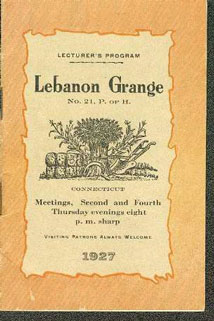
Lebanon Grange
Lecturer's Program - 1927
Program designating chairperson(s) and activities for all the bi-weekly Grange meetings from February 10, 1927 through January 26, 1928. Includes lists of committees with members and the Grange officers.
In 1884, Lebanon farm families organized the local chapter of the Grange. The National Grange of the Order of Patrons of Husbandry, is a fraternal organization in the United States that encourages families to band together to promote the economic and political well-being of the community and agriculture. The Grange, founded after the Civil War in 1867, is the oldest American agricultural advocacy group with a national scope. The Grange actively lobbied state legislatures and Congress for political goals, such as the Granger Laws to lower rates charged by railroads, and rural free mail delivery by the Post Office.
The newly formed Lebanon Grange immediately began work to build a hall which included a meeting space upstairs and a co-operative store downstairs, which the Grange ran for a few years before renting out the space to a succession of storekeepers. In Connecticut, the Grange was less political than in mid-western and western states. Granges advocated for the creation of the Agricultural College in Storrs and lobbied for farm legislation. The hall was a place of community social activity with an emphasis on education and home-made recreation.
Gift of Harold Geer
1999.021.010
__________________________________________________________________________________
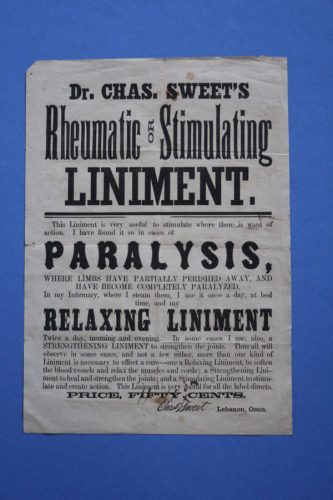
Handbill - Charles Sweet
Circa 1850-1875
In addition to treating patients at his medical offices, “Bonesetter” Charles Sweet sold containers of the liniments he used during treatments for bone dislocation, fractures and diseases. The various liniment recommended in the handbill were sold in small glass bottles. Surviving bottles smell strongly of licorice or anise. Sweet also sold a line of salves he recommended for treating scrofula and ulcers. The medications were sold at Sweet’s store in Lebanon and to other storekeepers and peddlers.
Although Charles “Bonesetter” Sweet (1810-1896) of Lebanon was not a graduate of a recognized medical school, the title of “doctor” was bestowed on him by public recognition of certain laymen with a particular skill as apothecaries, midwives or bonesetters.
And this was a skill, not just a “gift.” Bonesetters had hands-on training from a young age, usually with a family member. Charles Sweet learned his skill from his father, Benoni Sweet, who moved to Lebanon from Kingston, Rhode Island, in 1793. The Sweets came early to Salem, Massachusetts, and followed Roger Williams to Rhode Island where Williams founded a new colony of “dissidents” in 1637. Each generation had at least one Sweet practicing bone setting. With the arrival of Benoni and his wife Sarah Champion in Lebanon, the Sweet clan divided into two separate lines, one in Rhode Island and one in Connecticut.
Benoni and Ruth had nine children, of whom at least four learned the practice of bone setting. Benoni, Junior practiced in Guilford, Stephen practiced in Franklin, and a sister, Sally, practiced for a time in Willimantic. Charles appears to have been the most well-known. In addition to his practice in Lebanon, he established offices in Hartford, Norwich and Springfield, Massachusetts, which he visited periodically.
Gift of Elliott Sweet
1997.001.023
__________________________________________________________________________________
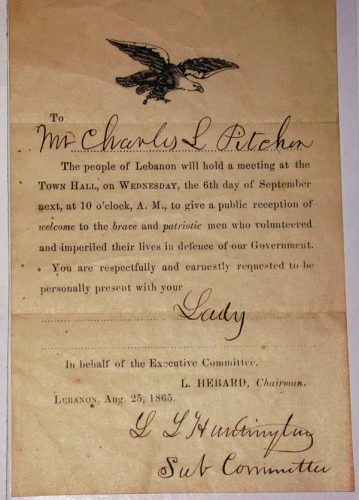
Civil War - Welcome Home Invitation
L.L. Huntington Subcommittee
April 25, 1865
Printed invitation to attend a meeting at town hall on September 6, 1865 to welcome home soldiers who had fought during the recently concluded Civil War. “Mr. Charles L Pitcher” and “Lady” are hand written as the invitees.
Charles L. Pitcher was born on September 26, 1839 in New York City, but lived most of his life in Lebanon. He joined Rifle Company D, 3rd Connecticut Volunteers on May 11, 1861 and was honorably discharge that August. Later, he joined Artillery Company D, 1st Connecticut Volunteers on March 5, 1862. After the War, on May 18, 1871, he married Augusta C. Holbrook. Pitcher died on July 14, 1928 at age 89
Gift of Robert Irons
2003.001.001
__________________________________________________________________________________
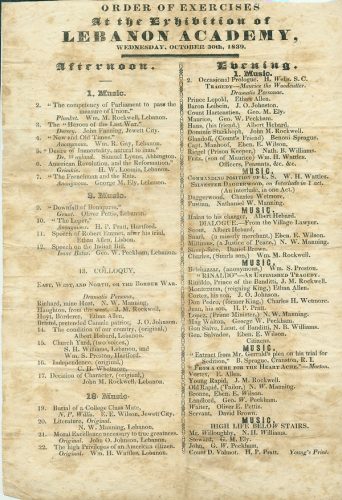
Order of Exercises at the Lebanon Academy
October 30, 1839
Very little is known about the Lebanon Academy except from this program and an essay written about 1855 by Ellen Bliss Huntington (1999.000.094). The 1839 Exhibition included afternoon and evening presentations by the scholars (all boys) who are listed as living in Lebanon, Abbington, Jewett City, Hartford and Lisbon. By the mid-1850, Ellen Huntington describes the Academy of the upper floor in a two story school house near the Brick Meeting House. Students include boys and girls who sat in “straight-backed” desks in a room filled with maps and blackboards.
This may have been a “select” school for older students after the much admired model of Lebanon’s 18th century Tisdale School which also attracted students from around the region.
Gift of Glenn Pianka
1998.014.001
__________________________________________________________________________________
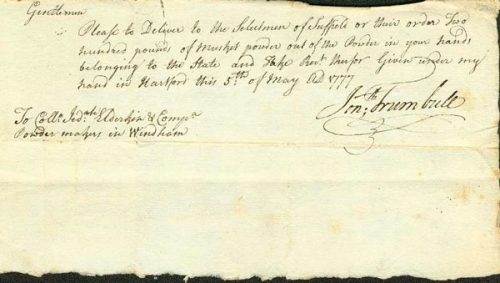
Military Orders
Governor Jonathan Trumbull
June 25, 1777
Order from Governor Trumbull to Colonel Jedediah Eldekin & Company, powder makers in Windham, requiring the delivery of 200 pounds of musket powder to be delivered to the selectmen of Suffield.
Lebanon Historical Society Collections
1999.000.110
__________________________________________________________________________________
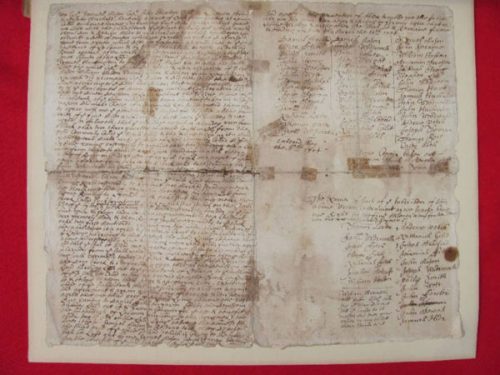
Petition
May 8, 1704
This petition was signed by 44 men who held title to land in Lebanon and sent to the General Assembly as part of an effort by Connecticut Colony to regularize early Native American land sales to land speculators. The petition asked that the signers’ titles to land within a 1692 “five mile purchase” from Oweneco by Samuel Mason, John Stanton, Benjamin Brewster and John Britchard be confirmed. In May 1705, the General Assembly did confirm the deeds in question.
Lebanon Historical Society Museum purchase
2010.025.001
__________________________________________________________________________________
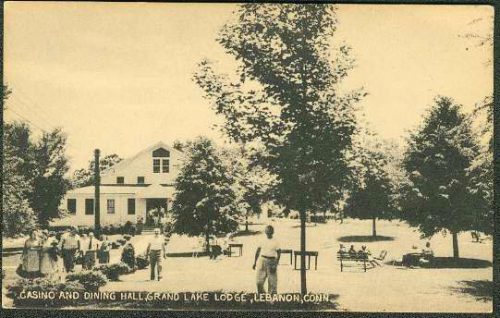
Postcard
Circa 1950
Published for Edward Wells, Dumont NJ by the Callotype Co. Elizabeth NJ & NYC
Black and white postcard showing a group of people in front of a large white-painted hall. Legend at the bottom identifies it as the “casino and dining hall, Grand Lake Lodge, Lebanon, Conn.”
Gift of Jared and Elizabeth Lasher
1999.008.002
__________________________________________________________________________________
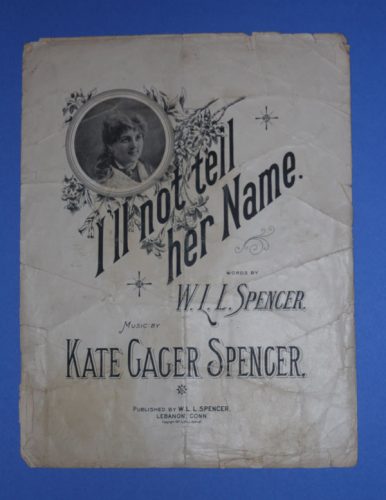
Sheet Music
"Ill Not Tell Her Name" - Copyright 1897
Words by W.L.L. Spencer
Music by Kate Gager Spencer
Kate [Gager] Spencer was a musician and then regimental band leader during the Civil War. Mrs. Spencer was a long-time organist for the Congregational Church in Lebanon before composing this piece of “parlor” music. Wilbur L.L. Spencer was a farmer, peddler and storekeeper at the Grange Hall before selling his mercantile business and returning to farming and selling agricultural implements and farm machinery in 1903.
This piece of music is the only known example of work by this couple, who became notorious a decade later when their son Bertram was convicted of murder during a trial that revealed a history of child abuse and mental illness.
Lebanon Historical Society Collections
1999.000.016
__________________________________________________________________________________
